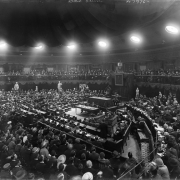The Impact of President-elect Trump’s Proposed Tariffs on Irish Business
Pictured: Michael E. Burke, Partner, Arnall Golden Gregory LLP
Michael E. Burke, Partner, Arnall Golden Gregory LLP, explores Donald Trump’s proposed tariffs on Irish business.
U.S. news outlets have extensively covered President-elect Trump’s proposed tariff plan, but little attention has been given to its potential impact on Irish companies and their exports to the United States. Addressing this gap, it is clear that the proposed tariffs would have a substantial negative impact on Irish exports to the U.S. The scope and severity of these tariffs surpass those imposed during the Boeing-Airbus dispute, which temporarily affected Irish businesses before being suspended in 2021.
The current proposal includes a 10%-15% tariff on all imported goods, with tariffs as high as 60% on imports from China, Mexico, and Canada. Additionally, the incoming administration has suggested a 100% tariff on goods from BRIC nations if they attempt to replace the U.S. dollar as the global trade currency. It remains unclear whether this 100% tariff would be in addition to the 60% tariff already proposed for China.
In the U.S. system, tariffs are paid by the importer of record for the tariffed product. This importer can be an Irish company’s U.S. affiliate, distributor, reseller, or other agent. Typically, tariff costs are passed on to American consumers, with the importer of record being reimbursed directly or indirectly through increased product prices.
Currently, the final details of the tariff plan remain uncertain, as they are subject to frequent changes. Nonetheless, Irish businesses must prepare for stricter conditions when exporting to the United States. Tariffs are likely to drive inflation in the U.S. economy, potentially weakening the U.S. dollar against the Euro. This could result in exchange rates that make Irish goods even more expensive for U.S. buyers.
Tariff changes in the U.S. are subject to a notice-and-comment period under the Administrative Procedure Act. During this period, companies potentially affected by proposed tariffs can request that specific products be excluded from the final tariff plan. However, it is anticipated that the notice-and-comment period for the proposed tariffs will be very brief, and few, if any, exceptions are likely to be granted.
Once tariffs are implemented, affected companies may request exemptions for specific products. These requests typically focus on items with limited or no availability in the U.S., products essential for national security, or items that U.S. manufacturers cannot produce in sufficient quantities to meet demand. While exemptions are sometimes granted for products from countries with free-trade agreements or similar initiatives, it is expected that jurisdiction-based exemptions will not be granted. Product-based exemptions are likely to be limited to components or parts used in manufacturing end products in the United States.
Irish businesses have limited options to mitigate the potential adverse effects of U.S. tariffs:
- Monitor Exemptions: Although chances of success are slim, Irish businesses should closely track Federal Register announcements for exemption opportunities. They should prepare detailed documentation to justify their requests, focusing on economic and operational impacts.
- Stockpile Inventory: Consider increasing inventory in the U.S. before tariffs take effect. Simultaneously, reassess pricing models to account for the added costs from tariffs.
- Adjust Supply Chains: Explore shifting production to the U.S., especially if tariffs reach or exceed 25%, a threshold that often prompts non-U.S. companies to relocate manufacturing operations to the U.S.
- Collaborate with U.S. Businesses: Evaluate options to acquire, merge, or partner with U.S. companies to gain access to established manufacturing and distribution capabilities within the United States.
- Leverage Duty Drawback Programs: Assess the feasibility of utilizing the U.S. duty drawback program to claim refunds on tariffs for goods that are subsequently exported, thereby reducing overall costs.
Despite the rhetoric, tariffs will negatively impact U.S. consumers and strain the U.S.-Ireland trade relationship. By implementing the strategies outlined above, Irish businesses can more effectively navigate the challenges of U.S. tariffs and mitigate their effects.










